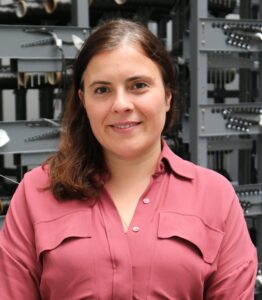
Home > Dr Clara Frias, Head of the Composites Centre, AMRC, University of Sheffield
Dr Clara Frias, Head of the Composites Centre, AMRC, University of Sheffield

“I did all my academic study in my home country Portugal. After finishing my first degree in Mathematics, I wanted to challenge what I learned by finding applications for it and my academic tutor encouraged me to pursue a study in engineering. Therefore, I did a PhD in science of engineering, in a topic linked to structural health monitoring for biomedical devices. Although it was not directly linked to composites, my PhD supervisor was the head of a composites centre for an RTO (Research and Technology Organisation) in Portugal, therefore I was based in a composites team and fell in love with composites. I stayed in the same composites centre after my PhD, as an R&D Project Manager focusing on structural health monitoring for composites. In 2010, I decided to move to a country where I could be more exposed to the composites industry, and the UK was at the top of my list, and I was lucky to be offered a Research Engineer role at NetComposites. I spent around 4 years at NetComposites during which I worked with a wide range of materials such as thermoplastic composites, graphene, and bio composites. Following NetComposites I was appointed as a Research Programme Manager at the University of Manchester. The research was in aerospace but with a big focus on composites because of my background. After 3 years at Manchester, I was offered a technical lead position at AMRC, part of the HVMC. This role allowed me to have even more engagement with industries, but also maintain some low TRL research, through which I could push young engineers to pursue a PhD study. Alongside with my day-today role, I am also one of directors at the Composite UK of Directors allowing me to be even more close with the UK Composite industry. In 2019, I became the Head of the Composites Centre at AMRC, focusing on the running of the centre from strategy, operation, capability and technology point of views, restructuring a team so that we could continue to support the UK composites industry. This role is different from my previous roles because it is less hands-on but more focused on leadership and mentoring junior members, and I am really enjoying it. COVID came along shortly after I became the Head of the Composites Centre. It was an incredibly challenging time for me – I took the role and suddenly the world just closed down. I needed to make sure the team could carry on delivering, and I also took extra care of their wellbeing. In our team we had people who were stuck in their house with their family and trying to work in that situation, and people whose family were in a different country, and they were blocked from seeing their family. I was lucky to have a strong senior team supporting the centre. We maintained regular contact with our team members to make sure they were OK, rather than just chasing for work. It was a challenging time, but we did well. We have kept innovative ideas coming and we are growing. I feel incredibly lucky that throughout my career there were many people who encouraged me to take the next steps. I also care about the legacy I leave behind. I feel it is my duty to support young engineers, help them to achieve their goals and overcome challenges that they face. I was born in a small village in the north of Portugal, and when I was young it was common to think females should be responsible for raising family, and academic study and career should not have high priorities. I received great support and advice from my mother – she was not as lucky as me to receive great education, but she helped me to build my resilience, so that nothing could stop me to go where I want to go, where I want to study, where I want to leave a legacy and make a better world. There were three other girls like me in my village I felt incredibly lucky to see them following their dreams like me. Throughout my career I have never felt I was given less because I am a female, and I am immensely proud to be the first female head of a research centre at AMRC. In engineering there has always been a lack of females. I am happy that I have the opportunities to support other female engineers. I like being there when they need me and if they are open for some support we should offer it to them, sometimes it is just listening. EDI is an important element of sustainability. Until we can make sure there’s fair treatment and opportunities to all, our decisions are going to be imbalanced. We have the obligation to demonstrate to show the value of the benefit of adding EDI – we can achieve more. We have quite a diverse team at AMRC – people with different genders, different educational, professional backgrounds and cultural backgrounds, you can hear people speaking different languages in the office! We appreciate everyone’s opinion and that has enabled us to achieve so much. We also try to understand different personalities and that has helped us to bring the most out of people. There is still a lot to be done but we are getting there!”